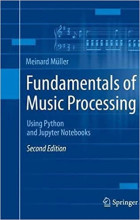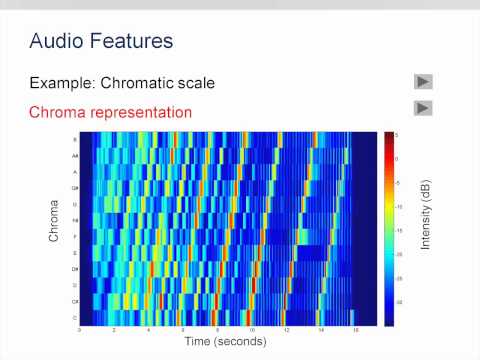Lecture: Music Processing Analysis, Winter Term 2024/2025






- Instructor: Prof. Dr. Meinard Müller
- Tutor: Simon Schwär
- Credits:
- 2.5 ECTS (Lecture only)
- 5 ECTS (Lecture with Exercises; only for selected study programmes)
- Time (Lecture): Winter Term 2024/2025, Mo 16:15–18:00
- Time (Exercises): Winter Term 2024/2025, Mo 14:15–15:45
- Place: Am Wolfsmantel 33, Erlangen-Tennenlohe, Room 3R4.04
- 1. Lecture: Mo 14.10.2024
- 1. Exercise: Mo 21.10.2024
- Note: There is no lecture/exercise on 11.11.2024.
- Dates (Lecture):
Mo 14.10.2024, Mo 21.10.2024, Mo 28.10.2024,
Mo 04.11.2024,
Mo 11.11.2024, Mo 18.11.2024, Mo 25.11.2024, Mo 02.12.2024, Mo 09.12.2024, Mo 16.12.2024, Mo 13.01.2025, Mo 20.01.2025, Mo 27.01.2025, Mo 03.02.2025
- The lecture Music Processing Analysis will be offered as a fully in-person event. Attendance is only possible physically at the seminar room of the AudioLabs (Am Wolfsmantel 33, Erlangen-Tennenlohe, Room 3R4.04).
- Please register for the course via StudOn prior to the first lecture. Please contact Simon Schwär for questions on StudOn.
- Besides a traditional lecturing format, this course will also be inspired by the flipped classroom concept. Important elements are:
- Reading assignments using the textbook [Müller, FMP, Springer 2021].
- Engaging with demonstrators provided by the FMP Notebooks.
- Programming using Python.
- We recommend students to prepare before the lecture. The lecture time can then be used for deepening the most important aspects, and for having a question–answering dialogue with participants.
- All FAU students can get an electronic copy of the required textbook via SpringerLink. To this end, you need to be logged in via an FAU account. It may be benefial to have a physical copy of the book to allow for offline reading. You may print out the required pages, or you may purchase a high-quality softcover edition at low cost (MyCopy softcover) following SpringerLink.
- For each lecture unit, you find a separate website with the following material:
- Specifications of reading assignments.
- The slides used for the lecture as PDF.
- Links to the FMP Notebooks.
- As a preparation for the lecture and exam, you find exam questions you should be able to answer.
- Check out this website as an example.
Content
Music signals possess specific acoustic and structural characteristics that are not shared by spoken language or audio signals from other domains. In fact, many music analysis tasks only become feasible by exploiting suitable music-specific assumptions. In this course, we study feature design principles that have been applied to music signals to account for the music-specific aspects. In particular, we discuss various musically expressive feature representations that refer to musical dimensions such as harmony, rhythm, timbre, or melody. Furthermore, we highlight the practical and musical relevance of these feature representations in the context of current music analysis and retrieval tasks. Here, our general goal is to show how the development of music-specific signal processing techniques is of fundamental importance for tackling challenging music analysis problems.
The general research area of music processing covers a wide range of subfields and tasks such as music anaylsis, music synthesis, computer music composition, performance analysis, or audio coding not to speak from close connections to other disciplines such as musicology or library sciences. In this course, we present a selection of topics with an emphasis on music analysis and retrieval having a focus on audio recordings. Most of these topics are connected to the research area known as music information retrieval (MIR), which aims at developing computational tools for processing, searching, organizing, and accessing music-related data.
The lecture closely follows the textbook Fundamentals of Music Processing (FMP). Additionally, the FMP Notebooks offer a collection of educational material, providing detailed textbook-like explanations of central techniques and algorithms in combination with Python code examples that illustrate how to implement the theory.
The following video gives a brief impression about this course.
Course Requirements
In this course, we discuss a number of current research problems in music processing and music information retrieval (MIR) covering aspects from information science and audio signal processing. While we provide the necessary background information, a good understanding of general concepts in signal processing and data science (e.g., algorithms, data structures) as well as strong mathematical background is required. Furthermore, good programming skills are a prerequisite for participating in the exercises. In particular, participants are required to experiment with the presented algorithms using Python and Jupyter notebooks. Furthermore, basic knowledge in music theory and a strong interest in music are extremely helpful to get enthusiastic about the field of music processing.
Links
- Accompanying textbook: Fundamentals of Music Processing
- Access to electronic version via SpringerLink (requires FAU account)
- Python Notebooks for Fundamentals of Music Processing: FMP Notebooks
- Related course: Music Processing – Synthesis by Maximilian Schäfer
- Further audio-related courses offered by the AudioLabs: AudioLabs Website
- International Society for Music Information Retrieval (ISMIR)
Accompanying Textbook and Notebooks

Meinard Müller
Fundamentals of Music Processing
Using Python and Jupyter Notebooks
2nd edition, 495 p., hardcover
ISBN: 978-3-030-69807-2
Springer, 2021
Accompanying Website
FMP Notebooks
Comprehensive framework based on Jupyter notebooks
for teaching and learning fundamentals of music processing.
Lecture: Topics, Material, Instructions, Questions & Answers
The lecture material includes textbook passages, notebooks, handouts of slides, videos, and so on. In the following list, you find detailed descriptions and links to the material. If you have any questions regarding the lecture, please contact Prof. Dr. Meinard Müller.
- Lecture: Introduction
- Lecture: Music Representations
- Lecture: Fourier Analysis of Signals
- Lecture: Audio Features
- Lecture: Music Synchronization
- Lecture: Music Structure Analysis
- Lecture: Chord Recognition
- Lecture: Tempo and Beat Tracking
- Lecture: Content-Based Audio Retrieval
- Lecture: Audio Decomposition
Exercises: Material, Instructions
The exercises, which are mainly offered to computer science, AI, and data science students, accompany and extend the lecture Music Processing Analysis. In the exercise meetings, we review the lecture, discuss homework problems, deal with programming issues, and realize mini-projects that implement basic algorithms and procedures. Note that good programming skills are a prerequisite for participating in the exercises. In particular, we assume basic knowledge in Python as covered by the PCP Notebooks. If you have any questions regarding the exercise, please contact Simon Schwär.
The exercise sessions take place from 14:15 to 15:45 in the same room as the lecture (3R4.04 in Erlangen-Tennenlohe) and will be separated into two phases.
Phase 1: Practical Basics for Music Processing
- Session 1, 21.10.2024: PCP and FMP-B
Preparation: Familiarize yourself with the PCP and FMP notebooks and make sure to install everything required to run the FMP notebooks on your own computer. Instructions can be found here. Note that the FMPcondaenvironment also works for the PCP notebooks and the exercise notebook below, so you only need to install one environment. - Session 2, 28.10.2024: Music Representations I
Preparation: Complete tasks 1, 2 and 3 from the MPAE Music Representations notebook (Download ZIP). - Session 3, 04.11.2024: Music Representations II
Preparation: Complete tasks 4 and 5 from the MPAE Music Representations notebook (Download ZIP). - Session 4, 18.11.2024: (Fast) Fourier Transform I
Preparation: Work through the PCP notebook on the Discrete Fourier Transform. - Session 5, 25.11.2024: (Fast) Fourier Transform II
Preparation: We will discuss Exercises 1-4 from the PCP notebook on the Discrete Fourier Transform. This session is also your last chance to ask questions about the Lab Exam notebooks (see below). - Lab Exams, 02.12.2024: STFT and HPSS
In this session, you will be asked to present your solutions to the two lab notebooks on STFT and HPSS. You should work on this in pairs which we can organize in the first few exercise sessions. You can bring the completed notebooks on your own computer or on a USB stick. The lab exams run with the FMP environment. You may ignore the questions marked as "Homework exercises". Do not hesitate to ask questions via mail or in the exercise sessions before 02.12.!
Phase 2: FMP Projects
In Sessions 6 (09.12.2024) to 9 (20.01.2025), we will work with FMP notebooks closely related to the current lecture topics and deepen our understanding of the discussed concepts, e.g. by evaluating some algorithms on our own music examples.
- Session 6, 09.12.2024: Project Kickoff
Preparation: Please think of projects based on techniques introduced in individual chapters/sections of the book. We will discuss possible experiments, music examples, and evaluation methods. We encourage you to form teams (only the reading assignment is an individual submission). - No joint exercise session on 16.12.2024.
You can make an individual appointment for this date to talk about your project with Simon. Remember that the reading assignment is due by Sunday, 12.01.2025, before the next regular exercise session. - Session 7, 13.01.2024: Project Work
- No joint exercise session on 20.01.2025.
- Session 8, 27.01.2025: Project Lightning Talks
Final presentation of project results in a short format – two minutes per person.
There are two required deliverables for passing the exercise:
- Reading Assignment: Due via e-mail to Simon by Sunday, 12.01.2025 — Each student must summarize a chapter from the FMP textbook using the provided Latex template (2 pages without references; do not copy text or figures from the book). These are individual submissions - do not work in groups.
- Notebook Presentation: Will be presented in the last exercise session on Monday, 27.01.2025 — Create a supplementary Jupyter Notebook for your chapter summary, including visualizations and audio examples using your own input data. The corresponding FMP notebooks should serve as the starting point. You are encouraged to work in pairs.
We can discuss possible topics for reading assignments and notebooks during the exercise sessions.


